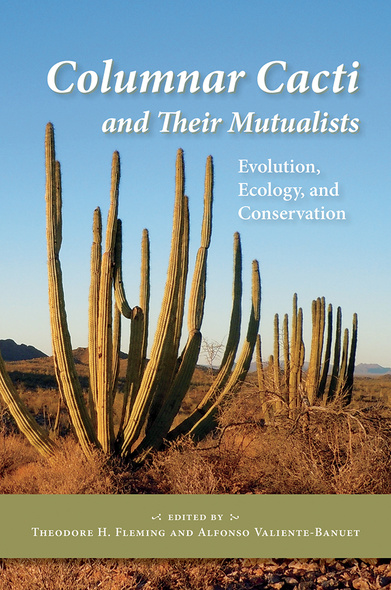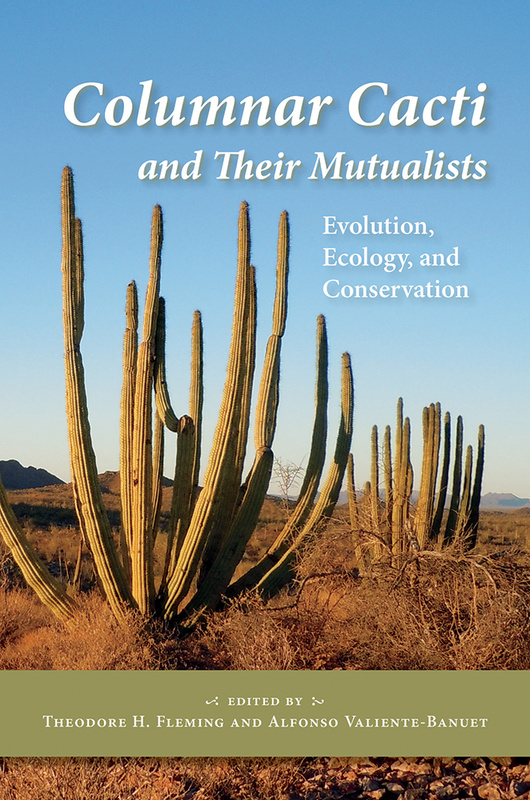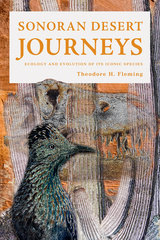
386 pages, 6 1/8 x 9 1/4
93 b&w illustrations, 49 tables
Paperback
Release Date:28 May 2019
ISBN:9780816540211
Columnar Cacti and Their Mutualists
Evolution, Ecology, and Conservation
Edited by Theodore H. Fleming and Alfonso Valiente-Banuet
The University of Arizona Press
Although cacti such as the saguaro and organ pipe have come to define the Sonoran Desert for many people, they represent some 170 species of columnar cacti found in many parts of the Americas. These giant plants are so dominant in some ecosystems that many species of animals rely on them for food and shelter. They are pollinated by bats in central Mexico and Venezuela, by birds and bees in northern Mexico and Peru.
This book summarizes our knowledge about the ecology, evolution, and conservation of columnar cacti and their vertebrate mutualists to show that the very survival of these cacti depends on animals who pollinate them and disperse their seeds. Contributors from the United States, Mexico, Venezuela, and Colombia explore aspects of geology and evolution that have forged this relationship, review findings in anatomy and physiology, and discuss recent research in population and community ecology as well as conservation issues. Ranging from the Sonoran Desert to the northern Andes, these studies reflect progress in understanding how abiotic and biotic factors interact to influence the evolution, distribution, and abundance of cacti and mutualists alike.
In addition, this book examines the ways in which humans, through the process of domestication, have modified these plants for economic benefit. The contributors also review phylogenetic relationships between cacti and nectar-feeding bats in an effort to understand how bat-plant interactions have influenced the evolution of diversity and ecological specialization of both. Because of the number of migratory pollinators feeding on columnar cacti, the authors make conservation recommendations aimed at preserving fully functional ecosystems in arid portions of the New World tropics and subtropics.
Columnar Cacti and Their Mutualists provided a benchmark for both conservation efforts and future research.
This book summarizes our knowledge about the ecology, evolution, and conservation of columnar cacti and their vertebrate mutualists to show that the very survival of these cacti depends on animals who pollinate them and disperse their seeds. Contributors from the United States, Mexico, Venezuela, and Colombia explore aspects of geology and evolution that have forged this relationship, review findings in anatomy and physiology, and discuss recent research in population and community ecology as well as conservation issues. Ranging from the Sonoran Desert to the northern Andes, these studies reflect progress in understanding how abiotic and biotic factors interact to influence the evolution, distribution, and abundance of cacti and mutualists alike.
In addition, this book examines the ways in which humans, through the process of domestication, have modified these plants for economic benefit. The contributors also review phylogenetic relationships between cacti and nectar-feeding bats in an effort to understand how bat-plant interactions have influenced the evolution of diversity and ecological specialization of both. Because of the number of migratory pollinators feeding on columnar cacti, the authors make conservation recommendations aimed at preserving fully functional ecosystems in arid portions of the New World tropics and subtropics.
Columnar Cacti and Their Mutualists provided a benchmark for both conservation efforts and future research.
Provides a wealth of reliable information and will be a must-have for anyone studying cacti or nectar-feeding bats. . . . Spending time with this book leaves no doubt that columnar cacti and their mutualists play important roles in the ecosystem they inhabit.’—Ecology
‘It is a book written at university level, but readable for the serious cactus enthusiast.’—Plant Science Bulletin
‘An important contribution to the literature on species interactions and mutualisms, as well as one of the most significant works ever published on the two topics of columnar cacti and nectar-feeding bats.’—Peter E. Scott, Indiana State University
Theodore H. Fleming is a professor of biology at the University of Miami and the author of The Short-Tailed Fruit Bat: A Study in Plant-Animal Interactions. Alfonso Valiente-Banuet is the head of the Community Ecology Laboratory and the Department of Functional and Applied Ecology of the Institute of Ecology, UNAM.





